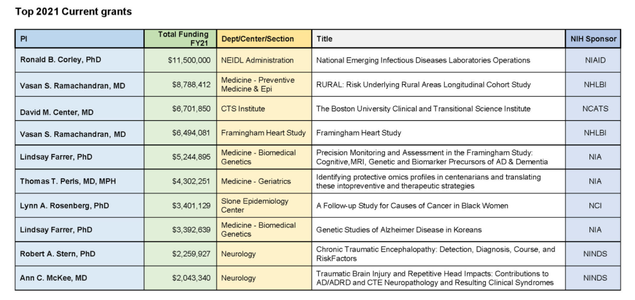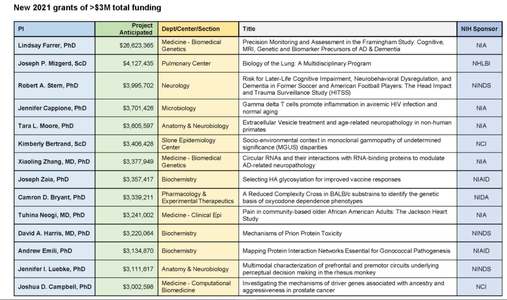Genetics News
To see more, check out our Past News and News from the Archives!
The top 2021 current grant awards


Dr. Zhang awarded NIH 1U01 Research Project grant
Circular RNAs and their interactions with RNA-binding proteins to modulate AD-related neuropathology
Dr. Xiaoling Zhang awarded NIH 1U01 Research Project grant
New variants, especially in non-coding regions, are expected to be discovered through the ongoing Alzheimer’s Disease Sequencing Project (ADSP). In 2020, NIA launched the ADSP Functional Genomics Initiative (RFA-AG-21-006) to strengthen the translational pathways leading from genetic variations to potential targets. In collaboration with Dr. Benjamin Wolozin in the Department of Pharmacology, we recently received a NIA U01 award ($3.6M) to identify circular-RNAs and their interactions with RNA-binding proteins to modulate AD-related neuropathology. This is one of the six awarded core projects of the new ADSP Functional Genomics Consortium (ADSP-FGC) which was established in August 2021.
This proposal will investigate circular RNAs (circRNAs) and RNA binding proteins (RBPs) that regulate or are regulated by these circRNAs. Recent genomic studies have discovered thousands of circRNAs produced from both protein-coding genes and non-coding regions of the genome via a process known as back-splicing. The discovery of circRNAs opens an entirely new window into mechanisms of neurodegeneration in AD and related dementias (AD/ADRD). This proposal seeks to identify and characterize disease-linked circRNAs and RBPs, and functional changes in circRNAs or circRNA-RBP interactions that modify ADRD neuropathology or neurodegeneration. Successful discovery of key circRNAs or circRNA-RBP interactions in aging human brains could uncover novel biomarkers, disease mechanisms, or therapeutic targets to diagnose, mediate, or prevent the progression of AD/ADRD. Read More Here
Dr. Sherva awarded NIH R01 Grant
Exploring mechanisms driving microbe-induced AD risk using next generations sequence data
Dr. Richard Sherva awarded NIH R01 grant
Multiple lines of evidence suggest microbial infections are risk factors for Alzheimer’s disease (AD). Amyloid-β (Aβ) peptides possess antimicrobial activity and may protect against human herpes viruses (HHV). Viral DNA is also detectable in Aβ plaques, and HHV DNA detected in next generation sequencing (NGS) experiments is associated with AD risk. Read More Here
Dr. Dasgupta Receives Faculty Diversity Award – Evans Day 2021
https://events.productivemedia.com/portal/view.php?eventId=BMC20211007
Dr. Farrer Receives Research Mentoring Award – Evans Day 2021
https://events.productivemedia.com/portal/view.php?eventId=BMC20211007
Dr. Gyungah Jun Faculty Promotion
CONGRATULATIONS!
Dr. Gyungah Jun, BUSM, Medicine/Biomedical Genetics, is a genetic epidemiologist who focuses on “big data” driven drug discovery for Alzheimer’s disease (AD). Dr. Jun has been involved in the large U.S. and international consortia to identify AD risk genes with or without stratification by APOE genotypes across multi-ethnic populations. This effort led to an innovative and novel therapeutic concept for AD based on the well-established protective effect of the APOE ε2 allele, while she is a site PI for a new cohort for prevention and treatment trials to target APOE in AD therapeutics. Dr. Jun is a Director of the Genome Guided Drug Discovery (GGDD) Core at the AI4AD consortium, which is a large coordinated national initiative for AD therapeutics and features transformative Artificial Intelligence (AI) approaches using human big data. She is a founding member of the Asian Cohort for Alzheimer’s Disease (ACAD) Consortium and Chairs two workgroups, Data Management and Data Analysis, as well as a steering committee member for the Framingham Heart Study Brain Aging Program (FHS-BAP), leading to identify genetic and molecular signatures from blood and brain. Dr. Jun recently joined in BU Alzheimer’s Disease Research Center as an Associate Director of the Genetic and Molecular Profiling Core.
Dr. Dasgupta honored as the recipient of the GMS Exceptional Teaching Award during COVID-19
Dr. Shoumita Dasgupta has been honored as the recipient of the GMS Exceptional Teaching Award during COVID-19, on behalf of the GMS Awards Committee. This award recognizes faculty who "embraced the GMS mission during the COVID-19 crisis and went above and beyond the expected contributions despite the challenges of the pandemic." Dr. Dasgupta was nominated for this award by the students and has made a significant impact on them during the COVID-19 crisis. Read more here
Dr. Zhang honored as a recipient of the 2021 Spivack Young Investigator Award
Dr. Xiaoling Zhang has been honored as the recipient of the 2021 Spivack Young Investigator Award as part of the Jack Spivack Excellence in Neuroscience Awards. These awards were established in 2013 to honor the work of outstanding BUSM faculty conducting research in Parkinson’s (PD), Alzheimer’s (AD), Chronic Traumatic Encephalopathy (CTE) and other neurological disorders. Dr. Zhang is being honored for her outstanding research in Alzheimer's Disease and "aims to to explore how individual cell types/subpopulations contribute to Alzheimer’s Disease patients with diverse ancestral backgrounds." Results from Dr. Zhang's research will help to "inform targeted functional studies to regulate AD-related GWAS genes in specific cell types in the AD brain." Dr. Zhang's research will also help with finding potential new drugs related to different ethnic groups in AD. Read more here
Dr. Gyungah Jun awarded new pilot grant to study genetics of Alzheimer’s Disease in Asian-Americans and Asian-Canadians
Dr. Gyungah Jun, along with fellow Principal Investigators, Li-San Wang, Professor of Pathology and Laboratory Medicine in the Perelman School of Medicine at the University of Pennsylvania, Helena Chui, of the University of Southern California, and Van Ta Park, of the University of California—San Francisco, has been awarded a two-year, $4.8 million pilot grant by the National Institute on Aging (NIA) for studies of the genetics of Alzheimer’s Disease in people of Asian heritage.
According to the official press release, "A key goal of the new project, which is called the Asian Cohort for Alzheimer’s Disease (ACAD), is to enroll a population of at least 5,000 participants of Asian Ancestry in the United States and Canada—a large enough sample to enable the discovery of new gene variants related to AD risk. ACAD will be recruiting participants over age 60 who have evidence of cognitive impairment, as well as age- and sex-matched controls who have no cognitive complaints. The researchers will compare the DNA, medical histories, and lifestyle factors of these two groups for clues to risks for dementia, and will track participants’ memory and other cognitive test scores."
Here is the list of ACAD media:
WEBSITE: http://www.acadstudy.org/
TWITTER - https://twitter.com/acadstudy
FACEBOOK - https://www.facebook.com/acadresearchstudy
INSTAGRAM - https://www.instagram.com/acadstudy
YOUTUBE - https://www.youtube.com/channel/UCXXRD2vMqVelogMoh00ujvw
Dr. Jun receives a new subaward agreement from the University of Southern California
Dr. Gyungah Jun has recently received a subaward agreement from the University of Southern California for a U01 award, titled “Ultrascale Machine Learning to Empower Discovery in Alzheimer’s Disease Biobanks.” For this grant, Dr. Jun will serve as a PI for the Genome Guided Drug Discovery Core and will contribute her expertise regarding aspects of human genomic guided drug discovery and biomarker development to this project linking to AD drug discovery. She will be responsible for data interpretation and analysis, and general project and personnel management at the Core in BUMC. She will also participate in the large consortium related activities for this project.